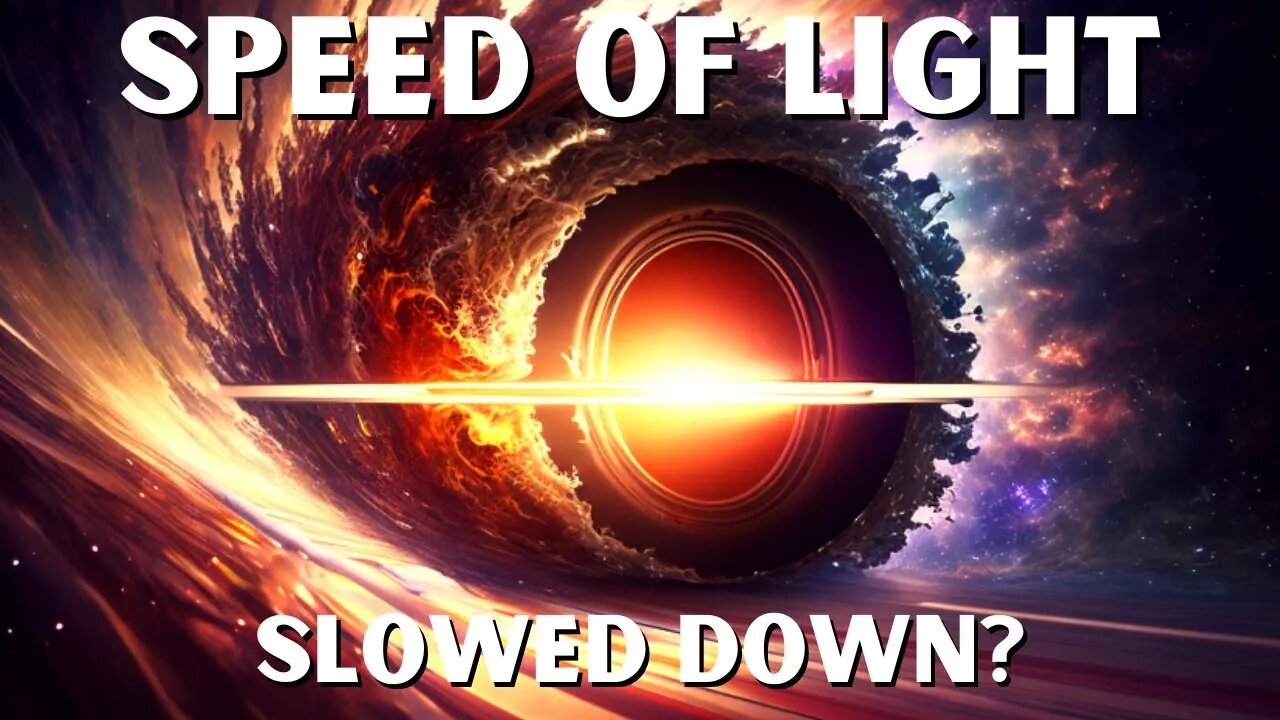Premium Only Content

What Would Happen If the Speed of Light Slowed Down?
What Would Happen If the Speed of Light Slowed Down?
Subscribe to Daily Dose Of Fact - https://bit.ly/2Z4b0m0
If the speed of light were slower, it would have a significant impact on the fundamental laws of physics and the way we understand the universe. Currently, the speed of light is considered to be a universal constant and is the speed at which electromagnetic radiation (including light) travels through a vacuum. This constant is used as a fundamental unit in physics, and is incorporated into many equations that describe the behavior of the universe.
If the speed of light were slower, it would mean that light would take longer to travel the same distance than it currently does. This would have a ripple effect throughout the universe, impacting everything from the way we understand the behavior of particles to the structure of the cosmos.
Here are some specific ways in which a slower speed of light would impact our understanding of the universe:
Time Dilation: One of the key effects of a slower speed of light would be a change in the phenomenon known as time dilation. According to the theory of relativity, time appears to move more slowly for objects that are moving at high speeds. If the speed of light were slower, the threshold for "high speed" would be lower, meaning that time dilation would be more pronounced at lower speeds.
The Structure of the Universe: The slower speed of light would impact our understanding of the structure of the universe. For example, the current understanding of the Big Bang theory relies heavily on the assumption that the speed of light is constant. If the speed of light were slower, the expansion of the universe would have been slower, and the structure of the universe would be different than what we currently observe.
The Behavior of Particles: The speed of light plays a key role in the behavior of particles, including their mass, energy, and momentum. A slower speed of light would change the way that particles interact with each other, and would impact many of the equations that describe their behavior.
The Study of Astronomy: Astronomy relies heavily on the study of light, and a slower speed of light would impact our ability to observe and study objects in space. For example, the light emitted by distant stars and galaxies would take longer to reach us, making them appear dimmer and less detailed.
The Search for Extraterrestrial Life: A slower speed of light would also impact the search for extraterrestrial life. Many of the methods used to search for signs of life on other planets rely on the detection of light, so a slower speed of light would make it more difficult to detect such signals.
The Study of the Early Universe: The slower speed of light would also impact our understanding of the early universe. For example, the cosmic microwave background radiation (which is thought to be the leftover radiation from the Big Bang) would be different if the speed of light were slower. This would impact our understanding of the early stages of the universe's evolution.
The Concept of Simultaneity: The slower speed of light would also impact the concept of simultaneity. Currently, the concept of "now" is relative and depends on the observer's position and motion. However, if the speed of light were slower, this concept would be further complicated, as the delay between the time of an event and its observation would be greater.
The Nature of Gravity: The speed of light is also related to the concept of gravity. In Einstein's theory of general relativity, gravity is described as the curvature of spacetime caused by the presence of mass and energy. The speed of light plays a key role in this theory, and a slower speed of light would impact our understanding of the nature of gravity.
The Formation of Stars and Galaxies: The slower speed of light would also impact our understanding of the formation of stars and galaxies. The formation of these objects is thought to be driven by the gravitational interaction of particles, and a slower speed of light would change the way that particles interact with each other, leading to different patterns of star and galaxy formation.
Fun fact: In 2015, a team of scientists at the University of California, Berkeley announced that they had managed to slow down light to 300 kilometers per second, about 900,000 times slower than its normal speed. They did this by passing light through a cloud of supercooled atoms, which caused the photons to interact with the atoms and slow down. While this achievement was impressive, it only slowed light down for a very short time and on a very small scale, and does not have any practical applications at this time.
-
 4:11:49
4:11:49
Nerdrotic
12 hours ago $32.86 earnedThe Best and Worst of 2024! Sony Blames Fans | Batman DELAYED | Nosferatu! |Friday Night Tights 334
160K29 -
 7:55:51
7:55:51
Dr Disrespect
16 hours ago🔴LIVE - DR DISRESPECT - WARZONE - SHOTTY BOYS ATTACK
215K30 -
 1:30:23
1:30:23
Twins Pod
15 hours agoHe Went From MARCHING With BLM To Shaking Hands With TRUMP! | Twins Pod - Episode 45 - Amir Odom
130K30 -
 1:02:30
1:02:30
Exploring With Nug
16 hours ago $3.70 earned2 Duck Hunters Missing After Kayak Capsizes!
58K4 -
 46:48
46:48
Mally_Mouse
10 hours agoLet's Hang!! -- Opening Christmas gifts from YOU!
67.8K1 -
 44:55
44:55
Athlete & Artist Show
20 days ago $2.04 earnedNHL 4 Nations Snubs, Was Hawk Tuah Coin A Scam?
65.7K -
 33:47
33:47
Stephen Gardner
15 hours ago🔥Pentagon Whistleblower UNLEASHES on Biden and Obama!
121K245 -
 2:20:30
2:20:30
The Dilley Show
17 hours ago $28.22 earnedRoger Stone in Studio plus Q&A Friday! w/Author Brenden Dilley 12/27/2024
99.4K22 -
 1:57:02
1:57:02
The Charlie Kirk Show
15 hours agoThe Great H-1B Battle + AMA | Lomez | 12.27.24
186K296 -
 11:39
11:39
Russell Brand
1 day agoWhat You're Not Being Told About The Syrian War
182K289